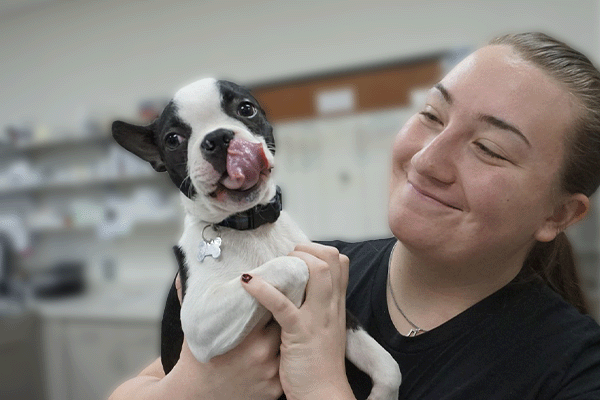8 Common Myths About Pet Heartworm Disease: Debunked
Critical Information on How to Prevent and Treat Heartworms in Your Pet
Heartworm disease is one of the most recognized illnesses by pet owners. We all know the name and are (hopefully!) aware of the preventatives used to protect our pets from them. But even still, much is misunderstood about this prevalent disease. Because of that, we’ve decided to debunk some of these myths or misunderstandings so you can provide your pet with the best protection.
Some Common Myths and FAQs on Heartworm Disease in Pets
The best way to treat heartworm disease is to prevent it from happening in the first place, and knowledge is always power when it comes to being a pet parent. If you understand this common illness, you can take steps to avoid it in your precious pet.
Some common myths and frequently asked questions on heartworm disease are:
- How do pets contract the disease?
Dogs and cats contract heartworms from mosquitoes. All it takes is one bite from a mosquito carrying the larva form of the heartworm to infect your pet. Heartworms affect all canines (including coyotes, foxes, and wolves), along with cats and ferrets.
The life cycle is as follows: an infected coyote gets bitten by a mosquito, and the mosquito takes in a blood meal, along with the “baby” heartworms. That mosquito then flies away and bites your dog a few days later. The matured “babies” can infect your pet during that blood meal. Those “baby” or larval forms of heartworms then mature to adulthood in your pet, and now your pet is considered infected. This means they are at risk for heart failure and can be a carrier, transmitting heartworms to other pets.
- If they are an “indoor only” pet, do they still need protection?
Have you ever had a mosquito inside your house? If you’ve lived in Texas for over three days, the answer is almost certainly yes. Remember, all it takes is one bite. It’s extremely rare for a dog NEVER to go outside. Of course, in these instances, that dog will have a much smaller risk of contracting heartworm disease. Even so, they’re still at risk. Given that the cost of a heartworm preventative can be as inexpensive as $35/6 months, and the treatment for heartworm disease is easily $1000+, the risk is not worth it.

- Don’t they just need protection in the spring and summer?
As we all know, Texas is the best state in the union, and the secret is out. Because of that, many people have moved from places that experience four seasons. If you used to live in Michigan, you did not have to worry about any mosquitoes from about December to April. Despite the many great things we experience here in Texas, we, unfortunately, must worry about mosquitoes year-round. Thus, we need to keep our pets protected at all times.
- My cat doesn’t need heartworm protection, right?
This common misconception is closely related to the “indoor only” pet comment. True, many feline pets are indoors only and never go outside. Thus, all the advice given above holds true. The other common misconception is that cats can’t contract heartworm disease. They undoubtedly can.
Two big reasons make heartworm disease a significant concern for cats. First, we are not able to effectively test for it in cats. In dogs, we have a very effective, easy blood test. Unfortunately, this test does not translate to cats. This means that we often don’t discover a cat has heartworms until they are in a respiratory or cardiac crisis. Secondly, we don’t have an effective treatment for heartworms in cats. There is an effective treatment for heartworms in dogs, but it is too dangerous to be used safely in cats. Therefore, if your cat is diagnosed with heartworms, you are only left with one choice—to put them on a preventative now and hope they outlive them, which will be 3-5 years in cats.
So, this is a cost/benefit (or risk) analysis question. Is spending $16-25/month on prevention worth it to safely prevent a real, albeit potentially small, risk of a life-threatening condition in your beloved family member? We’d say yes!
- My dog has always been on protection; why do I need to test them?
This is a very valid question with answers that may vary from veterinarian to veterinarian. The fact of the matter is that pet health care can be expensive. Often we need to compromise, as we do in so many other areas of our lives, as we try to manage our personal expenses. So, we recommend the latter if it comes down to spending $35 on a heartworm test vs. $35 for six months of generic heartworm preventative.
It is still best to test our canine companions yearly for heartworm disease for two significant reasons. Nothing in medicine is 100%. Although all the heartworm prevention products on the market are quite effective, they are not 100% effective. There can still be failures for various reasons, mostly surrounding the administration.
Our dogs are clever and can often hold a pill in their mouth for five minutes before promptly spitting it out. Or perhaps they immediately go outside and vomit. You might be using a topical preventative and accidentally don’t apply the entire contents to the skin and instead get some on the fur (where it is not absorbed). Of course, you can have true medication failure as well.
This brings us to the second reason to test for heartworms annually. If you have a documented history of purchasing heartworm preventatives from a veterinarian or licensed pharmacy for the past year AND a negative heartworm test performed within the past year if your pet is diagnosed as positive for heartworms, the manufacturer of that heartworm prevention will pay for treatment. Now, that’s standing behind your product!
- Why must my pet be on a “drug” each month?
Once again, this concern has some validity but is conflated between a few products. All but two heartworm preventatives are monthly doses by either an oral formulation or topical. The logical thinking is that the medication stays in your pet’s body for one month. Although one can understand the logic behind this, that is not true.
The reasoning behind the one-month dosing is based on the heartworm life cycle. From the point of infection, i.e., an infected mosquito bites a dog that’s not on a preventative, there is a 30-45-day period from when that “baby” heartworm or larval form transitions to an adult form that can cause disease. Our preventatives are only effective against these larval forms, as they do not kill adult heartworms. And if you can kill all the larvae, you can prevent your pet from getting heartworm disease. So even if your dog is bitten every day for a month by infected mosquitoes, but you give a heartworm preventative, that heartworm preventative is analogous to a bomb that simply kills all the larval heartworms. So, it is not that the medication stays in your pet for 30 days; it kills all the larvae your pet may have every 30 days.
An exception to this is Proheart 12 or Proheart 6. Proheart is an injectable heartworm preventative; the 12 and 6 refer to the length of time it provides protection. Proheart 12 offers 12 months of protection, and Proheart 6 provides six months. This medication does stay in your pet’s body for 6-12 months. It accomplishes this using a technology called microspheres. The microspheres house the medication and slowly dissolve over time, thus giving a slow yet constant release of preventative. So, this medication does, in fact, stay in your pet for 6-12 months. However, one of the biggest reasons for a medication “failure” is that our pet does not actually ingest it, never mind us accidentally forgetting a month here or there. This medication addresses that issue.

- Is it true that heartworm preventatives have killed some dogs?
While this holds some validity, it’s a bit exaggerated, like some of the other notions. Medicine is not 100%. Could a pet have a severe anaphylactic reaction to a new heartworm preventative? It is possible; most veterinarians will tell you they’ve never witnessed it.
Furthermore, was that pet tested for heartworms before the preventative was given, and thus died of heartworm disease, not the preventative that was unfortunately started too late? These are all questions that must be answered before condemnations are made. But also, there are risks with any medication, making it even more vital for you to discuss those concerns with your veterinarian.
Another closely related concern is that heartworm preventatives cause seizures. A popular product called Trifexis was associated with this rumor. Trifexis was one of the first “all in one” products available, i.e., it protected against heartworms, intestinal parasites, and fleas. Spinosad was the active ingredient that killed fleas. Spinosad is known to lower the seizure threshold in dogs. Every pet has the potential to have seizures, and some have a condition like epilepsy that allows them to have seizures more easily and frequently. A preventive with this known side effect is not recommended for these pets. But it is essential to understand that it does not CAUSE the seizure, nor is the manufacturer hiding that fact. Due to the advent of more encompassing preventatives, like Simparica Trio, that don’t come with that side effect, Trifexis is not quite as popular.
- Is there an all-natural heartworm preventative
Unfortunately, no, at least not anything effective. Most veterinarians are not against “all-natural methods,” but they need to be effective for us to recommend them. Most purported all-natural preventatives are centered around repelling mosquitoes. And although, in theory, that is a great idea, there is not an all-natural or synthetic substance that works well.
Once again, we are looking at a risk/benefit analysis—do you feel confident enough in the mosquito repellant you apply to your pet to repel all mosquitos? Remember, all it takes is one infected mosquito.
Heartworm disease is a widespread condition that affects both dogs and cats. It is a potentially life-threatening condition in both species but does seem to affect dogs more often than cats. It is easily prevented in an overwhelming number of circumstances. If you have a pet living where mosquitoes are a problem, a mosquito repellant isn’t an effective heartworm preventative. From a statistical perspective, it is not a question of if your pet will get heartworms but when they will.
In addition to preventatives, the best protection against pet heartworms is educating yourself, which is why all veterinarians would direct you to the American Heartworm Society. This veterinarian-run resource contains almost all the information you could ever want or need on heartworms. The fact that there is a dedicated society to a single disease should give you an idea of how significant heartworms are to our pet’s health care and are not to be dismissed or deemed insignificant. It would be best if you addressed any concerns with your veterinarian.
There are many options for preventing this common illness, so please don’t hesitate to contact us to discuss which is best for your precious pet.
